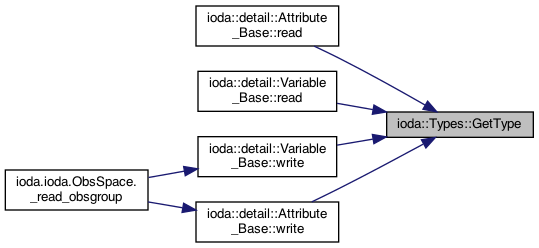Type System
The data type system. More...
Collaboration diagram for Type System:

Files | |
| file | Marshalling.h |
| Classes and functions that implement the type system and allow for frontend/backend communication. | |
| file | Type.h |
| Interfaces for ioda::Type and related classes. | |
Classes | |
| struct | ioda::detail::Object_AccessorTypedef< T > |
| struct | ioda::detail::Object_AccessorTypedef< std::string > |
| class | ioda::Type |
| Represents the "type" (i.e. integer, string, float) of a piece of data. More... | |
| struct | ioda::Types::is_string< T > |
| Convenience struct to determine if a type can represent a string. More... | |
| struct | ioda::Types::is_string< std::string > |
| Convenience struct to determine if a type can represent a string. More... | |
| struct | ioda::Types::GetType_Wrapper< DataType, Length > |
| Wrapper struct to call GetType. Needed because of C++ template rules. More... | |
Macros | |
| #define | IODA_ADD_FUNDAMENTAL_TYPE(x) |
Typedefs | |
| template<typename DataType > | |
| using | ioda::Object_Accessor = typename detail::Object_AccessorTypedef< DataType >::type |
| typedef std::function< Type(gsl::not_null< const ::ioda::detail::Type_Provider * >)> | ioda::Types::TypeWrapper_function |
Functions | |
| template<class DataType , int Array_Type_Dimensionality = 0> | |
| Type | ioda::Types::GetType (gsl::not_null< const ::ioda::detail::Type_Provider * > t, std::initializer_list< Dimensions_t > Adims={}, typename std::enable_if<!is_string< DataType >::value >::type *=0) |
| For fundamental, non-string types. More... | |
| template<class DataType , int String_Type_Length = constants::_Variable_Length> | |
| Type | ioda::Types::GetType (gsl::not_null< const ::ioda::detail::Type_Provider * > t, std::initializer_list< Dimensions_t >={}, typename std::enable_if< is_string< DataType >::value >::type *=0) |
| For fundamental string types. These are either constant or variable length arrays. Separate handling elsewhere. More... | |
Detailed Description
The data type system.
Macro Definition Documentation
◆ IODA_ADD_FUNDAMENTAL_TYPE
| #define IODA_ADD_FUNDAMENTAL_TYPE | ( | x | ) |
Value:
template <> \
inline Type GetType<x, 0>(gsl::not_null<const ::ioda::detail::Type_Provider*> t, \
std::initializer_list<Dimensions_t>, void*) { \
return t->makeFundamentalType(typeid(x)); \
}
Macro that defines a "fundamental type" that needs to be supported by the backend. These match C++11.
- Since
- C++11: we use bool, short int, unsigned short int, int, unsigned int, long int, unsigned long int, long long int, unsigned long long int, signed char, unsigned char, char, wchar_t, char16_t, char32_t, float, double, long double.
- C++20: we also add char8_t.
Typedef Documentation
◆ Object_Accessor
template<typename DataType >
| using ioda::Object_Accessor = typedef typename detail::Object_AccessorTypedef<DataType>::type |
Definition at line 258 of file Marshalling.h.
◆ TypeWrapper_function
| typedef std::function<Type(gsl::not_null<const ::ioda::detail::Type_Provider*>)> ioda::Types::TypeWrapper_function |
Function Documentation
◆ GetType() [1/2]
template<class DataType , int Array_Type_Dimensionality = 0>
| Type ioda::Types::GetType | ( | gsl::not_null< const ::ioda::detail::Type_Provider * > | t, |
| std::initializer_list< Dimensions_t > | Adims = {}, |
||
| typename std::enable_if<!is_string< DataType >::value >::type * | = 0 |
||
| ) |
◆ GetType() [2/2]
template<class DataType , int String_Type_Length = constants::_Variable_Length>
| Type ioda::Types::GetType | ( | gsl::not_null< const ::ioda::detail::Type_Provider * > | t, |
| std::initializer_list< Dimensions_t > | = {}, |
||
| typename std::enable_if< is_string< DataType >::value >::type * | = 0 |
||
| ) |
